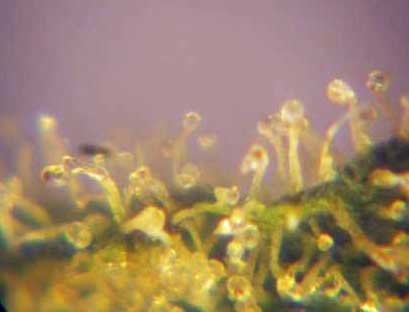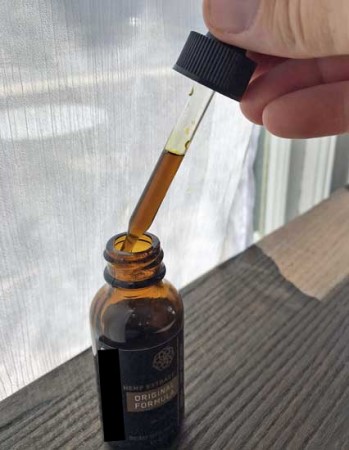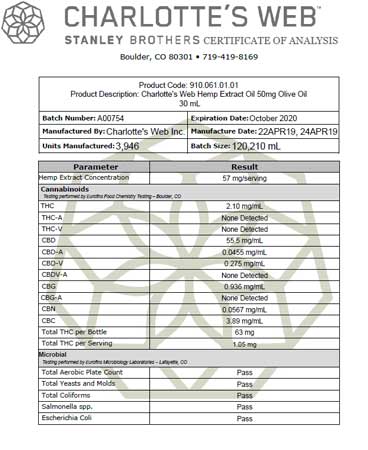updated: 7-6-2021
CBD is everywhere these days . . . but what does it all mean?
Hemp 101
First of all, let’s quickly review some basic hemp biology.
Cannabis and hemp both refer to the same plant, Cannabis sativa. However, cannabis is a version of that famous plant that usually contains high levels of THC. THC is the only intoxicating chemical in the plant. You usually need to visit a dispensary in person to purchase cannabis products.
Hemp, on the other hand, only contains small amounts of THC (less than 0.3%). For this reason, it is legal to purchase hemp products online. All three types of hemp extract described below can ship to all 50 states. Everything I discuss on this page are hemp extracts. Hemp extracts usually contain high amounts of CBD. That’s why most people use the phrase hemp extract and CBD oil interchangeably.
Below, I describe the three different types of CBD oil.

Image:
A close-up view of the oily resin produced on tiny hairs along the flowers of the hemp plant. These oils are naturally filled with CBD, THC, terpenes and other chemicals. When a hemp company extracts chemicals from the hemp plant, the oily resin delivers most of these desirable chemicals.
Different categories of CBD
Isolate: contains only CBD with no other cannabinoids or other natural chemicals from the hemp plant
Broad-spectrum: does not contain THC, but does contain CBD, other cannabinoids, terpenes and other natural chemicals from the hemp plant
Full-spectrum: does contain THC* as well as CBD, other cannabinoids, terpenes and other natural chemicals from the hemp plant
* Full-spectrum only contains a small amount of THC, less than 0.3%. This amount usually equates to less than 1 mg. of THC per serving. Everyone is different, but 1 mg. of THC is barely noticeable for many people. Personally, I only begin to feel the effect of THC between 1-2 mg.
All three CBD categories mentioned above are legal at the federal level and can be purchased online. Unfortunately, Amazon currently does not allow the sale of these items so you must purchase directly from a company’s website.
Which type of CBD product is best for you?
First of all, I don’t recommend CBD isolate.
- We have seen a lot of scientific data suggesting additional chemicals from the hemp plant enhance the effects of CBD, so it doesn’t make sense to just isolate CBD. The ability of other cannabinoids and terpenes to enhance CBD effectiveness is called the ‘entourage effect‘.
- Additionally, a pharmaceutical company is currently seeking FDA approval for a full spectrum cannabis extract. In 2020, GW Pharma is conducting clinical trials to confirm that their drug (nabiximols) is effective to treat muscle stiffness (with multiple sclerosis and spinal cord injury). They’re also trying to gain approval for anxiety, irritability and sleeplessness (associated with PTSD). If GW Pharma thought pure CBD was a stronger drug candidate, then they would be using CBD isolate in their clinical trials rather than full spectrum nabiximols.
The decision between full spectrum hemp and broad spectrum hemp is a personal decision.
- Some people don’t want any THC in their CBD oil. If you are hyper-sensitive to THC, then avoid full spectrum. Most people try both broad and full spectrum oil then see what works best. Both options offer the entourage effect. The only difference is: full spectrum contains a small amount of THC while broad spectrum contains 0% THC.
Sidenote: For the sake of simplicity, I am focusing this review article on oils. Oils are just hemp extract sold in the form of a flavored oil. As you would imagine, almost all hemp and CBD companies also sell edibles and soft-gel capsules. Edibles and capsules (pills) are derived from the same hemp extract as oils, they’re just formulated and packaged differently.
Purity and potency vary between CBD brands
When I consider the quality of different CBD or hemp extract companies, I think in terms of purity and potency.
Potency refers to the amount of CBD and other natural plant chemicals (CBC, CBN, THC, terpenes, sterols, etc.) that are present in each serving. If we focus just on CBD content, we often see a range between 15-50 mg. of CBD per serving. With oils, one serving is a full dropper (1 ml).
I prefer between 25-50 mg. of CBD per serving. Keep in mind, prices tend to increase as you approach 50 mg. of CBD per serving.
Purity refers to the levels of contamination present in each CBD product. Contamination includes pesticides, microbes, heavy metals or residual solvents. As you would imagine, you don’t want any of this contamination in your hemp product.
Fortunately, all of the best CBD companies perform tests for purity and potency. They also make this information accessible to the consumer.
The results of purity/potency testing data is provided to the consumer in the form of a certificate of analysis (COA).

This is a dropper pulling one serving of CBD oil out of the bottle. A full dropper is 1 ml. (millilitre).
Most quality CBD oil products will list CBD content in mg. (milligrams) per 1 ml. serving.
Both of the brands discussed below perform extensive purity and potency tests. These companies make their COA documents publicly available on their website. Also, both brands offer full spectrum and broad spectrum oils, as well as capsules, topicals and edibles.
Charlotte’s Web has been my main source of full spectrum oil for the past two years. This is an incredibly well-respected company, they’re considered best of breed in terms of full spectrum oil.
Charlotte’s Web has an interesting story. The company was developed in 2011 by a collection of brothers from Colorado. The Stanley brothers crossbred various strains of marijuana and industrial hemp in order to arrive at a plant with low levels of THC and high levels of CBD. Their plant strain became famous when it was used by Charlotte Figi, a young girl with epilepsy.
My advice… try the product that made them famous, its called their Original Formula. It’s a full spectrum hemp oil made in small batches with an alcohol extraction. This original formula contains 50 mg of CBD per dropper.
PlusCBD was one of the first CBD brands established in the US. They were also the first CBD company to end up selling in supermarkets and CVS, so they did something right earlier than anyone else.
PlusCBD is also slightly cheaper than Charlotte’s Web and they offer more product options (creams, edibles, soft gels, sprays, etc.) I have no hesitation recommending them as I know how meticulous and consistent they are with manufacturing.
I’m a biologist so I love that the parent company of PlusCBD employs medical doctors and scientists. They invest in scientific research surrounding CBD and the manner it engages with our body.
Their most popular product is probably these soft gel capsules. These soft capsules are filled with full spectrum hemp extract and are perfect for people who don’t like the taste of the oils.
Just a heads up … there is currently a wacky, 1970s vibe to their website…
Can you purchase CBD oil or hemp extract on Amazon?
Nope.
As many CBD consumers are aware, you cannot purchase CBD products from Amazon. That’s why the links I posted above take you directly to a CBD company website.
For now, if you want to shop on Amazon for hemp products, you can only purchase hempseed oil. Hempseed oil does not contain any CBD or THC. Hempseed oil is derived from the seeds of the hemp plant and this oil is only a rich source of omega-3 fatty acids. People use hemp oil on their salads.
If you want to drizzle some hempseed oil on your next salad, try Nutiva Organic Hemp Oil.
Hemp seed oil is not the same as hemp extract.
It doesn’t contain any CBD or THC, but hempseed oil is loaded with omega-3.
More details on the COA documents
When you visit a CBD company website and review their CBD products, you should be able to find a link to the product’s COA document. Sometimes a COA link is listed on the product page. This may also be found attached to a batch record. When in doubt, you can email the company and ask where to find this info.
Below is a screenshot of a sample certificate of analysis document from a CBD oil bottle that I bought earlier this year.
This is the information I want to see before I purchase the oil.
From that COA example, you can see there is 57 mg (milligram) of hemp extract per serving. Of that 57 mg of hemp extract, 55 mg is pure CBD. That is a relatively potent amount of CBD per serving.
I know that one full dropper of extract is 1 ml (milliliter) and 1 ml of volume is considered one serving.
55 mg of CBD per serving is on the high end for a single dropper, which if good because I already know that’s the amount I enjoy.
You can also see each serving contains 2 mg of THC. I know I will feel slightly buzzed if I consume any more than 2 mg of THC. Therefore, I only want to take one serving of this oil. For context, I’m a lightweight when it comes to THC. Many people could ingest 3-4 mg of THC and barely even notice.
If you look at the bottom section of the batch record you can see that their oil is also free from microbial contamination. That’s important to see because hemp plants can soak up lots of microbial and pesticide contamination from the soil. The plant acts like a sponge in this regard.
Okay, now you know how to measure quality when looking at various CBD products.
You check for the purity and potency data on the attached COA reports!
Remember you cannot find Plus cbd oil or Charlotte’s Web oil on amazon. This may change in the near future.
Any health statements on this page have not been evaluated by the Food and Drug Administration. The products discussed on this page are not intended to diagnose, treat, cure or prevent any disease.
Some of the links on this page are affiliate links. I may receive a small amount of compensation if a purchase is made after clicking on one of these links. I tried lots of different CBD brands before I formed an opinion on these brands. If you want to support this website and thank me for the information I provide, then click on a link and buy some CBD.
Thanks!
~ the EthnoHerbalist


